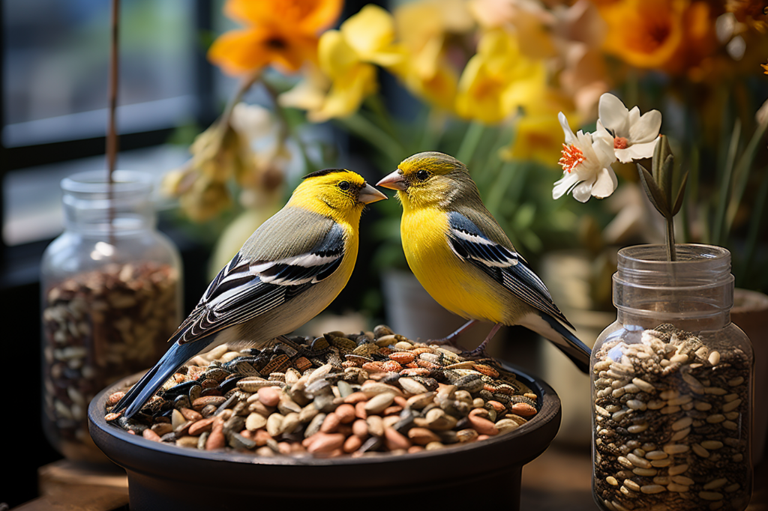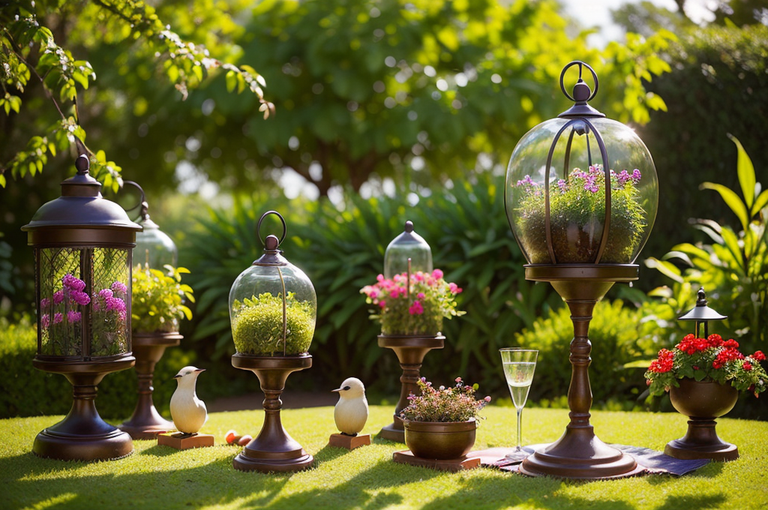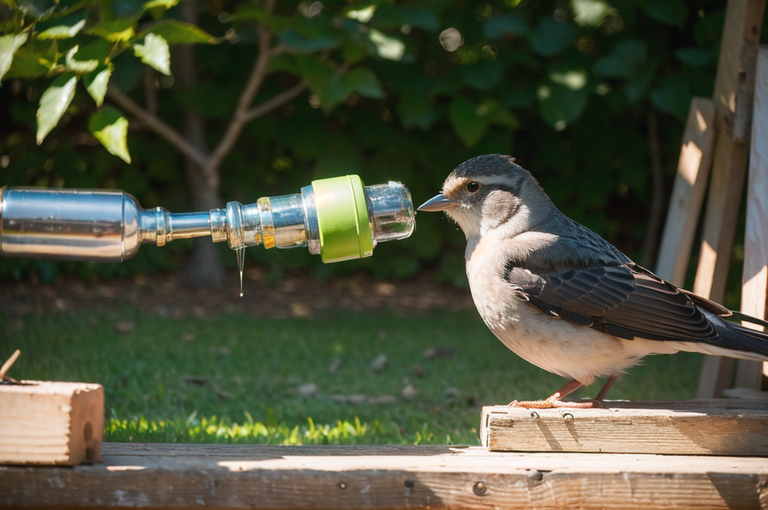Optimizing Bird Feeding: A Guide to Quality, Cost-Effective, and Seasonally Adjusted Birdseed Selection

The article discusses premium quality bird foods, cost effectiveness, regional adjustments of birdseed, variety of blends, expert advice, seed size and type, and the importance of storage and freshness.
The Significance of Premium Quality Bird Foods
Like the early born lark, I often find myself reflecting on the importance of providing wild birds with premium quality foods. But why exactly is top tier sustenance essential? 🤔
The Impact of Quality Bird Foods
Embracing superior quality bird feed isn’t just about the feathered friends’ health. It’s about the efficient utilization of your resources too. When you cater to your avian visitors with the best dried fruit for wild birds, you offer them a rich source of nutrients they’ll be keen to return for. Every morsel is packed with the right mix of vitamins and minerals, eliminating waste and guaranteeing that every peck counts.
The Pull of Quality Bird Feed for Specific Species
But the value runs deeper, stretching to the core of bird watching attracting diverse species. Preferred foods can vary greatly from bird to bird. When you’re dealing with wild birds, one size fits all rarely applies. With a meticulously planned assortment of premium feeds, you cater to a wider palate, drawing in an array of bird species. Their iridescent colors and unique songs are your reward, transforming your backyard into a lively orchestration of nature at its best.
Economic Advantages of Premium Bird Food
Lastly, we must address the elephant (or eagle) in the room – premium bird foods, while seeming high upfront, are an economical investment. Going for low grade options may seem like a cost saver, but remember, quality attracts quantity. When the wild birds in your area recognize your yard as a trusted food haven, they’re bound to visit frequently. The result? A rich and diverse bird watching experience, right outside your window.
In nature, as in life; quality trumps quantity, always. Genuine bird lovers understand the benediction of birds thrumming a melodious symphony in their backyards and to achieve it, settling for second best was never an option.
Cost Effectiveness of Bird Seeds
As someone deeply involved in all things avian, it’s an irrefutable truth that acquiring the best bird seed for wild birds can help keep our feathery friends healthy and happy. But, let’s not forget about cost effectiveness too, as it plays a vital role. So, how do we strike that perfect balance between high quality and financially sustainable bird seeds?
Minimizing Wastage
To make every penny count, minimizing wastage must be our first call of duty. Like leaving no stone unturned while exploring a new bird habitat, we should ensure no seed goes to waste. Implementing effective strategies to keep seeds safe from weather elements and pests could bolster this cost saving endeavor greatly. Picture a perfectly stored seed pile with nary a morsel wasted doesn’t that seem just splendid?
Excluding Filler Grains
Next, we flit to the matter of filler grains. Often, bird seed blends are peppered with low quality grains that most wild birds typically ignore. They akin to going on an ornithological expedition and finding no birds, disappointing and pointless! By choosing blends devoid of such grains, we can ensure every seed provides value, much like the joy we receive from every successful bird watching session.
Buying in Bulk
Lastly, buying bird seed in bulk can lead to significant savings. Imagine the thrill akin to discovering an untapped bird observatory, except this time, it’s a treasure trove of bird seeds! Larger quantities invariably cost less per unit, enabling us to provide nourishing meals to our winged visitors without burning a hole in our pockets.
Cost effective bird feeding is a beautiful symbiosis between being financially savvy and fostering healthier bird populations. And trust me, the chirping thanks you’d receive from grateful beaks are absolutely priceless!

Adjusting Birdseed to Seasonal and Regional Needs
Nature sings an ever changing harmony and to keep in tune, we need to get wild about birds by optimizing their meal plans. Aligning birdseed types with the rhythm of the seasons and the unique needs of regions is a critical part of maintaining a healthy feeder population.
Seasonal Adjustments to Birdseed
The seasons spin a fickle wheel of fortune for our feathered friends. As winter’s chill sets in, birds require high energy, oil rich seeds like black oil sunflower seeds or suet, to not only survive but thrive during the harsh conditions. Spring and summer, on the other hand, call for lighter fare such as millet or sunflower chips perfect for singing sparrows and finches.
Regional Adjustments to Birdseed
Geography too, plays a key role. Birds in arid environments chew on hull less seeds like Nyjer seed to stay hydrated while birds in coastal areas I’ve observed, tend to flock to mineral rich options like cracked corn.
Importance of Variety in Birdseed Blends
Offering a variety of birdseed blends is akin to hosting a feast for our avian friends. A diverse blend not only appeals to a plethora of palates, but also ensure each bird gets the right balance of nutrients they need to soar.
Observe. Listen. Adjust. That’s the melody of meeting the diverse and changing needs of these enchanting, winged wonders. The symphony may sound complicated, but remember, each note you strike revives a chorus in the avian world, one that echoes in the grateful twitter of a songbird or the soaring ballet of a flock in flight. After all, who wouldn’t want their yard to brim with the vibrant cacophony of Mother Nature’s most fleet and graceful maestros?
Expert Advice on Birdseed Selection
Often, when endeavoring to provide the best food for wild birds, we inevitably find ourselves needing a touch of expert advice. ⭐️
Role of Expert Advice in Bird Feeding
Seeking professional insight in the realm of bird feeding can significantly enhance our efforts. It helps us understand feathered friends’ nutritional needs better and curate a menu that ensures they thrive. This guidance is not merely helpful for birds but also serves to deepen our personal joy in the hobby and our connection to nature.
Operation of Efficient Bird Feeding Areas
To create efficient feeding habitats based on expert suggestions, one needs to understand different types of birds and their dietary preferences. 🐦 Variety isn’t just the spice of life; it’s a key component in a wild bird’s diet. Certain species prefer sunflower seeds, while others may opt for nectar or mealworms. Successful operation of a bird feeding area is mastering the time honored balancing act between a diverse menu and a suitable environment.
Maintaining Economical Bird Feeding Locations
Financial considerations inevitably creep into our love filled endeavors. Yet, here too, expert advice can be beneficial. For instance, bird feeders filled with local seeds are often a hit with the locals and amicably light on our wallets too. Buying in bulk and preserving seeds in a cool, dry place can also significantly cut costs without compromising our feathery visitors’ dinner.
After all, the essence of bird feeding isn’t measured in banknotes, but the joyous trills filling the air and the myriad colors enlivening your garden. 🍂
Maintaining Freshness and Correct Storage of Bird Seed
Ensuring the freshness of bird seed is as vital an endeavor as making the choice of the best dried fruit for wild birds or selecting the best bird seed for wild birds. There’s something incredibly rewarding about maintaining a nutritious smorgasbord a wildlife version of a farmer’s market, if you will for our fluttery friends. Indeed, freshness can greatly influence the attractiveness of the feed to wild about birds population.
The Importance of Bird Seed Freshness
If we align ourselves more with their perspective, we might comprehend the importance placed on the freshness of bird feed. Imagine, if your supper of choice turned stale or unappetizing it’s unlikely that you’d partake in the feast. Similarly, if bird seed isn’t fresh, it loses its allure, even for the hungriest of birds.
Efficient Bird Seed Storage
Storing bird feed efficiently prolongs its shelf life, ensuring the nutrients remain intact while simultaneously creating a banquet that remains appealing to any species. To preserve freshness, opt for cool, dark spaces and airtight containers. These precautions can save your feed from unwanted moisture and critters too!
Ensuring Quality in Bird Seed
It is not just about the storage, though. Ensuring the quality of bird feed is paramount, with the goal of being the best food for wild birds within our reach. In practice, this means fewer chaffs and more feed. Whenever possible, try to ascertain the percentage of chaff in the birdseed, a higher percentage may indicate a lower quality feed.
To house the spectacle of birds we so admire, I always maintain that quality and freshness of birdfeed are non negotiable. With this mindful approach, together we create a haven that aids these magnificent creatures, nurturing both their lives and our spirit of bird watching. Remember, also, that this is a journey of learning and love for nature. Patience, care, and a willingness to adapt can only enhance the relationship we share with these winged wonders.


